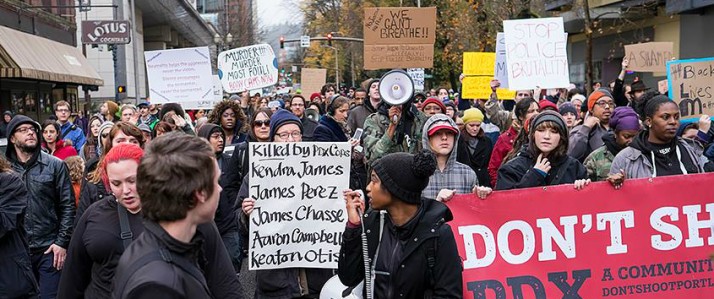Editor’s Note: Marjory Hamann is MRG’s former executive director and currently works on rural economic development. Her doctoral dissertation focused on the barriers and motivations of white people taking actions in support of racial justice. We invited Marjory to share her perspective on what white allies can learn from the events in Ferguson, Missouri, complementing our executive director’s analysis of events unfolding in Ferguson and throughout the country.
As a child growing up in North Carolina after desegregation, my understanding of race and racism was shaped by crossing the color line—an invisible but undeniable border between communities.
As one of just a few white kids in a choir of 70 students, I listened year after year as our advisor, Mrs. Harris told us we had to “work twice as hard and perform twice as well.” She made it clear that our behavior had to be impeccable when we traveled away from home for choral competitions. That if we got in trouble the results could be more serious for us than for students from predominantly white schools. Most white kids don’t get to hear that message delivered and it’s stayed with me ever since.
Mrs. Harris also liked to tell us she was from Missouri, or as she called it—the Show Me State. As in, “Don’t tell me what you can do. Show me.”
Lessons from the Show Me State
I found myself thinking of Mrs. Harris as I listened to the news from Ferguson, Missouri. The shooting of Michael Brown has shown us once again that we live in a world in which Black men are routinely subject to extreme, sometimes fatal, reactions from police officers.
The rush to acquit officer Darren Wilson without a trial has shown us that institutions of power and authority will protect their own people rather than hold them to a rigorous standard of service for everyone in the community.
This pattern has been repeated again and again, from Ferguson to Staten Island to Cleveland — and across the country.
Allies Responding to Ferguson
How we respond as white allies shows others where we stand on the injustice of a system shaped by racial privilege and oppression.
I recently overheard a small group of white people discussing Chris Rock’s video How Not to Get Your A** Kicked by the Police that’s been circulating on Facebook. Instead of commenting on the video’s biting satire, the conversation focused on how “true” his advice was—if you don’t want to get arrested, don’t break the law.
Instead of ignoring deep racial disparities in the criminal justice system, allies can inspire our peers to back reforms being proposed by the people most affected by those disparities.
One person went on to say that if Black people protesting police brutality want our sympathy, they should stop destroying their own community. Because from a distance, “it just doesn’t look good.”
But the real distance that exists between white commentators in Oregon and protestors in Ferguson isn’t about mileage. It’s about the space that exists between the reality of everyday life for many white people and the very different reality people of color face throughout the United States. When you’re white, it’s possible to believe that the system will work for you if you behave. On closer examination it’s clear that the system doesn’t work for many folks in communities of color.
As allies, it’s our responsibility to examine things more closely by looking beyond the mainstream news and listening to the voices of people on the ground in Ferguson to understand why people are outraged.
It’s our responsibility to engage and educate white friends as well as ourselves; the ability of white people to believe the current system is working actually depends on people of color being targeted. As a white woman, my supposed need for protection is used to justify someone else’s oppression. Tough on crime politicians tell me I am safe because they will go after criminals who don’t look like me, especially Black men. As blogger Scot Nakagawa asserts, anti-Black racism is the fulcrum of white supremacy.
Beyond Ferguson
Growing up in a predominantly Black school system, I learned lessons many white kids don’t get to learn.
My middle class white parents taught me to respect authority with the assumption that the authority figures served the community. But Mrs. Harris and others like her taught me about the fears Black parents face—that when a child leaves home, he may never return, and that the people hired to protect the community could be the reason he doesn’t.
As allies, we can follow the lead of people who know that fear all too well and who are organizing across the country to bring change to a criminal justice system that can decide the killing of an unarmed Black man is not a crime without even needing a trial.
Because, ultimately, we will need more than feelings of empathy to create a world in which the police, military, and courts make up a system of true justice; we’ll need solidarity and a movement to make structural changes. And that will take all of us showing elected officials that anything less is unacceptable.





